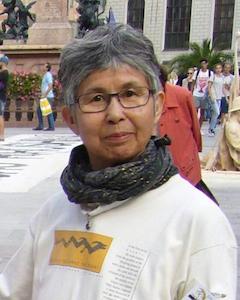Tjan was born into an Itelmen indigenous gatherers and hunters’ family in Kamchatka, a big peninsular in the Russian Far East. In her childhood, her grandmother taught her to observe the weather, so after she graduated from high school, Tjan started to work as a meteorologist at a local weather station.
To follow a desire to see the world, Tjan went to Moscow, where she married a Soviet dissident. Together they started to reprint an underground press (Samizdat) on human rights violations in the USSR which was an illegal activity according to Soviet laws.
Tjan also studied her mother-tongue Itelmen language and traveled around Kamchatka in search of native speakers. But the Soviet security service KGB obstructed her human rights activity.
In January 1980, all Tjan’s Samizdat papers were confiscated during the house search in Moscow, along with the hand-written copy of the Itelmen dictionary and Itelmen language audio tapes.
Several months later, just before the Moscow Olympics games in 1980, she and her whole family were deprived of Soviet citizenship and deported from the Soviet Union. Since then, Tjan has been living in Munich, where she continues her human rights work and informs the local public about the indigenous peoples’ rights violations in Russia.
She also informed people in Germany about the negative impacts of mining on indigenous lands and the traditional way of life in Russia, which is especially important because Germany is one of the biggest international consumers of Russian natural resources, which are mainly extracted from indigenous peoples’ lands in the Russian Arctic, Siberia and the Far East.
Since the mid-1990s, Tjan initiated several educational and cultural projects on traditional Itelmen fishing in Kamchatka and preserving the Itelmen language.
Tjan is a member of the Munich regional group of the Society for Threatened Peoples (STP).

